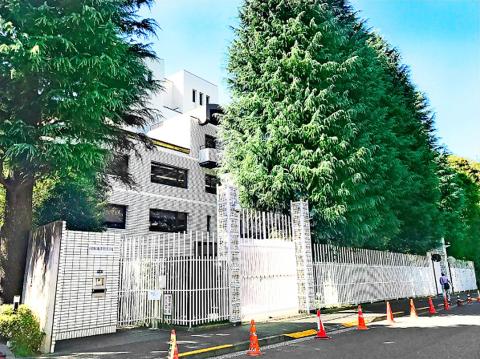The properties used by the Taipei Economic and Cultural Representative Office (TECRO) in Japan are registered under the name of Ma Chi-chuang (馬紀壯), a former Taiwanese diplomat who died 18 years ago, Representative to Japan Frank Hsieh (謝長廷) said, urging the Ministry of Foreign Affairs to resolve the issue to avoid complications.
The properties consist of an office compound and a residence with a combined floor size of 5,634m2 on a 3,069m2 plot in Tokyo’s Shirokanedai District, Hsieh said, adding that they were purchased by the Taiwanese government, but registered under Ma’s name.
Their ownership has not changed hands even though there have been eight representatives since Ma, Hsieh added.

Photo: Miki Chang, Taipei Times
“Ma passed away a long time ago and his possession of office properties in Japan is likely to cause problems. I suggest that the Ministry of Foreign Affairs should authorize the office to register its properties under an entity with an appropriate name,” Hsieh said.
The plots are estimated to have a market value of ¥10.8 billion (US$103.6 million) and the structures are worth about ¥5 billion, sources said.
According to Japanese records, Ma is listed as a member of the East Asian Relations Association Tokyo Office — the name used by the office prior to 1992 — and the lot address on the deed is similarly a defunct address used by the former association, Hsieh said.
After Japan withdrew its diplomatic recognition of the Republic of China (ROC) in 1972 in favor of Beijing, the People’s Republic of China moved to acquire the ROC embassy in Japan as a “diplomatic asset.”
In 1986, the office registered its properties in then-representative to Tokyo Ma’s name to prevent them being taken over by Beijing.
Although Ma left the post in 1990 and died in 1998, the deeds for the properties were never transferred to his successor, Chiang Hsiao-wu (蔣孝武), or to any subsequent representative, Hsieh said.
An official from the office said on condition of anonymity that transferring deeds “is a waste of money.”
However, a Japanese realtor of Taiwanese descent disputed the claim, saying: “Transferring deeds is inexpensive. The costs of stamp duties, scriveners’ fees and the like are minimal, but going through eight representatives without changing the registration is likely to cause major problems.”
According to the realtor, private landowners are little affected by their failure to update deeds to record property transfers after the death of the original property owners, but governments that registered their holdings under an individual or a foundation cannot afford to do so because of the business dealings they must conduct.
“When you change the representative, the registered property holder must be changed accordingly,” the realtor said.
Hsieh said he was “shocked” to learn of the issue.
“The conduct of the nation’s affairs should reflect Taiwan’s status as a nation. We should not save money on paperwork by using defunct foundations and deceased individuals to register the office’s property,” he said.
To prevent Chinese seizure of diplomatic assets, newly appointed office representatives should take over the property rights of all office holdings, or the government should establish a permanent foundation under which holdings would be registered, Hsieh said.

CHAOS: Iranians took to the streets playing celebratory music after reports of Khamenei’s death on Saturday, while mourners also gathered in Tehran yesterday Iranian Supreme Leader Ayatollah Ali Khamenei was killed in a major attack on Iran launched by Israel and the US, throwing the future of the Islamic republic into doubt and raising the risk of regional instability. Iranian state television and the state-run IRNA news agency announced the 86-year-old’s death early yesterday. US President Donald Trump said it gave Iranians their “greatest chance” to “take back” their country. The announcements came after a joint US and Israeli aerial bombardment that targeted Iranian military and governmental sites. Trump said the “heavy and pinpoint bombing” would continue through the week or as long

TRUST: The KMT said it respected the US’ timing and considerations, and hoped it would continue to honor its commitments to helping Taiwan bolster its defenses and deterrence US President Donald Trump is delaying a multibillion-dollar arms sale to Taiwan to ensure his visit to Beijing is successful, a New York Times report said. The weapons sales package has stalled in the US Department of State, the report said, citing US officials it did not identify. The White House has told agencies not to push forward ahead of Trump’s meeting with Chinese President Xi Jinping (習近平), it said. The two last month held a phone call to discuss trade and geopolitical flashpoints ahead of the summit. Xi raised the Taiwan issue and urged the US to handle arms sales to

State-run CPC Corp, Taiwan (CPC, 台灣中油) yesterday said that it had confirmed on Saturday night with its liquefied natural gas (LNG) and crude oil suppliers that shipments are proceeding as scheduled and that domestic supplies remain unaffected. The CPC yesterday announced the gasoline and diesel prices will rise by NT$0.2 and NT$0.4 per liter, respectively, starting Monday, citing Middle East tensions and blizzards in the eastern United States. CPC also iterated it has been reducing the proportion of crude oil imports from the Middle East and diversifying its supply sources in the past few years in response to geopolitical risks, expanding

Pro-democracy media tycoon Jimmy Lai’s (黎智英) fraud conviction and prison sentence were yesterday overturned by a Hong Kong court, in a surprise legal decision that comes soon after Lai was jailed for 20 years on a separate national security charge. Judges Jeremy Poon (潘兆初), Anthea Pang (彭寶琴) and Derek Pang (彭偉昌) said in the judgement that they allowed the appeal from Lai, and another defendant in the case, to proceed, as a lower court judge had “erred.” “The Court of Appeal gave them leave to appeal against their conviction, allowed their appeals, quashed the convictions and set aside the sentences,” the judges